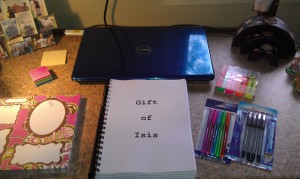Why do you keep writing, month after month? Why do you persist at honing your craft when encouragement is little or non-existent? What is your dream?
Me, I want it all. I want the New York Times bestseller (even though I know the NYT generally ignores genre writers and so doesn’t actually reflect the highest-selling books). I want to walk into a bookstore or a library and see my precious manuscript on a shelf, printed and bound and shiny. I want to be able to write full time. But more than all of that, I want to share my stories with the world.
Trying to break into the publishing world is a long slog, isn’t it? I have friends who are self-publishing. I don’t intend this post to be about the benefits or otherwise or self-publishing, so I’ll just say that it’s not for me. The publishing world is changing at a rapid pace. Some predictions are dire. E-books are apparently on the verge of taking over the world. Bookstores are closing. Some people say we will barely recognise the publishing industry in a few years. And yet still we push on.
So why do we do it to ourselves? Is it arrogance? A belief that although the world doesn’t yet recognise our genius, it will in time? Is it stubbornness? An unwillingness to let go of the dream just because it seems so far out of reach? I’ve been thinking about this over the last few months and the only answer I can come up with is from my “want” list: I want to share my stories. I don’t have a crystal ball so I don’t know whether perhaps the day might come when the dream dies and I pack away my thesaurus, dictionary, index cards and assorted coloured pens and highlighters. Perhaps that will happen but maybe – just maybe – I will persist until I actually break through.
In the meantime, I wanted to share with you two quotes I have pinned on the wall in front of my writing space. One is from Stephen King’s ON WRITING and likely most aspiring writers will recognise it:
It’s about the pumpkin.
Don’t know what it means? Get a copy of ON WRITING and read it. Seriously, if you intend to make a career out of writing, you should be familiar with this book. Buy or borrow it, read it, and take note of the story about the farmer and his pumpkins.
The second one is on a cardboard star. I have no idea where it came from. It’s about two inches big and is green and silver. It says:
Dream Big
That says it all, doesn’t it? This is what the aspiring writer does. Perhaps your dream is different to mine. Perhaps not. That doesn’t matter. What matters is that we all have the same goal: we are all dreaming big.
What do you keep in your writing space to inspire you?

